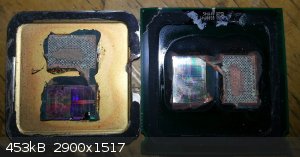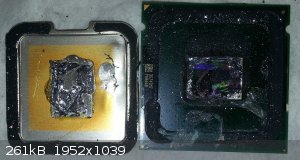RogueRose
International Hazard
    
Posts: 1585
Registered: 16-6-2014
Member Is Offline
|
|
Gold is dissolving in hot HCl + H2O2 solution
I've been doing a few tests of electronics scrap dissolving gold plated pins & connectors as well as a few old CPU's and have done 4 tests now
where 95+% of the gold has dissolved into solution it seems. I've used 32% HCl + 35% H2O2 and water in a 6:4:1 ratio. I've heated to about 120 to
start the reaction and then try to keep it around there.
In one experiment I had about 70 of the gold connectors on PCI-Ex16 or 32bit & 64bit PCI-X cards which have about 144-240+ per card, some were
extended 64bit with over 400 pins. After dissolving all 70 I could count less than 100 foils after sitting for 2 days. After the initial first 6
hours the bottom was THICK and covered by a layer and after being kept on a warming station for 2 days, most all disappeared and the solution went
from a nice green to almost brown/black.
I did this 3 more times, the next 2, exact same results, but I added some IDE, Sata, SCSI, SAS pins and VGA, etc. Same exact thing.
So I decided a last test, do it small so I got 2 grams of the CAT5 female jacks, pulled the gold wires from it & some very high quality female VGA
connectors, trimmed ANY part with solder or that wasn't 100% plated and repeated the experiment. This time I immediately got a blue solution (first
time ever) and after a little it turned green. Other times it always started yellow then went green and sometimes ended up blue when the HCl was used
up (adding more HCl turned it back to green). After a couple days there are maybe 4-5 specs (2-5mm long x 1-2mm wide) in the 20ml beaker. the
solution is still green. I did keep the temp at about 120 for about 30-40% of the time and once got it to 170 for about 2 hours.
I'm wondering if gold can be dissolved in hot concentrated HCl/H2O2 or if the presence of the chlorides of other metals in solution might be helping
dissolve the gold. Since HNO3 is used as the oxidizer for aqua regia, might it not be possible that strong H2O2 (35% is relatively strong) might not
do the same? I do think some Cl2 gas might have been produced, but not much.
I did notice that I would get lots of bubbles immediately after adding more H2O2 (a "foam up") once that stopped, the metals would slowly bubble away
until I stirred and then it would fill be beaker with bubbles about 80% of the beaker with the bottom 20% remaining "clear green). when I stopped the
bubbles dissipated and reappeared when stirring. I'll get video next time as I can't figure out why this odd bubbling behavior happens on stirring.
I really need to get some Tin II chloride to test this solution for gold, but I'm tight on $$ now after ordering a lot of glass.
Any ideas on if this HCl/H2O2 + heat is dissolving the gold or could something else be happening?
|
|
|
unionised
International Hazard
    
Posts: 5102
Registered: 1-11-2003
Location: UK
Member Is Offline
Mood: No Mood
|
|
HCl and H2O2 will generate chlorine and chlorine attacks gold.
|
|
|
Ubya
International Hazard
    
Posts: 1232
Registered: 23-11-2017
Location: Rome-Italy
Member Is Offline
Mood: I'm a maddo scientisto!!!
|
|
You are using hydrogen peroxide too concentrated, you are loosing most of it by decomposition (high temp).
Plus I found this
Attachment: Peroxide-Acid-Method.pdf (675kB)
This file has been downloaded 497 times
---------------------------------------------------------------------
feel free to correct my grammar, or any mistakes i make
---------------------------------------------------------------------
|
|
|
RogueRose
International Hazard
    
Posts: 1585
Registered: 16-6-2014
Member Is Offline
|
|
Using too high a concentration of H2O2 make sense. IT starts out fine but once it gets warmer, it bubbles off quickly and when adding more it does
the same. I was just trying to keep the "level" down so there wasn't so much liquid.
I just got 4 gallons of 12.5% sodium hyprochlorite for $1 total! I'm waiting for the price to drop so it will be a REFDUND to buy it of $1/gallon -
yes they uwill pay you $1 to buy 1 gallon of 12.5% pool shock with a special promotion. I just wish i knew some really good uses for this and I'd
buy 10-30 cases (40-120 gallons) or more.
|
|
|
clearly_not_atara
International Hazard
    
Posts: 2691
Registered: 3-11-2013
Member Is Offline
Mood: Big
|
|
AFAIK it works fine. HNO3 is used in aqua regia because it was discovered long before hydrogen peroxide -- back before the theory of chemical
elements.
As noted above, HCl + H2O2 will generate chlorine, albeit slowly. Chlorine dissolved in HCl is sufficient to dissolve gold.
[Edited on 04-20-1969 by clearly_not_atara]
|
|
|
DraconicAcid
International Hazard
    
Posts: 4278
Registered: 1-2-2013
Location: The tiniest college campus ever....
Member Is Offline
Mood: Semi-victorious.
|
|
You don't need to generate chlorine in situ to dissolve gold- the presence of chloride stabilizes the gold ions enough that it becomes much easier to
oxidize the metal, so agents like nitric acid and hydrogen peroxide will do.
Please remember: "Filtrate" is not a verb.
Write up your lab reports the way your instructor wants them, not the way your ex-instructor wants them.
|
|
|
RogueRose
International Hazard
    
Posts: 1585
Registered: 16-6-2014
Member Is Offline
|
|
Maybe someone can answer this. Many of these CPU's have a metal heat shield on them, on the top of the CPU. Underneath that are the cores (in
silicon wafers). On the underside of the heat sink (which is almost NEVER magnetic - haven't seen one that is yet) is often a coating of gold, some
actually thick (one older one has about 1/2g coating) where the new ones it is super thin. I'm wondering if there is a way to disolve the gold off
the heat sink w/o havingto dissolve the entier piece of metal, since it's probably a 1000:1 ratio of XX metal to gold, if not more.
Here are a couple pictures of what i inside of a CPU with the gold plating. The older ones had foil thick enough that once it abraded off you could
roll it up with your finger. This almost loks like you can see through it. I guess this is for heat or maybe grounding?
Finally I'm going to have a lot of pretty pure silicon after processing all of my electronics, probably a few (4-8KG if I do ALL of my electronics).
I've never seen anyone try processing and though you needed HF to do it and was wondering if this would be worth saving to later refine or at least
maybe use it to make some interesting alloys that require silicon maybe?
 
|
|
|
Wizzard1
Harmless

Posts: 10
Registered: 13-2-2019
Member Is Offline
|
|
Reverse electroplating will do the trick - Use the nickel-plated copper IHS as an anode and simply wipe it with a salty, wet brush attached to a 5v
source as a cathode.
There's more money in the indium solder there than there is in gold - It's worth a bit more than silver.
|
|
|